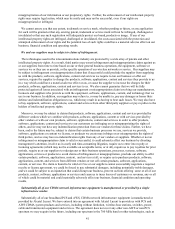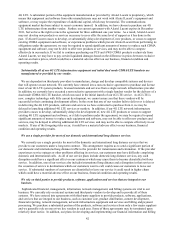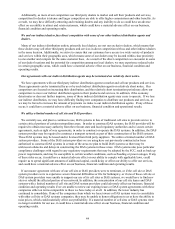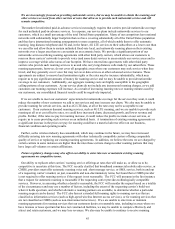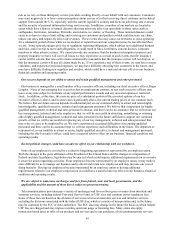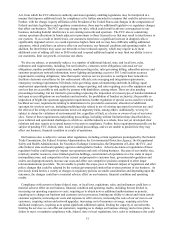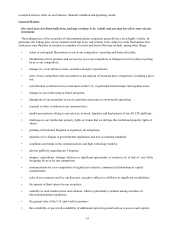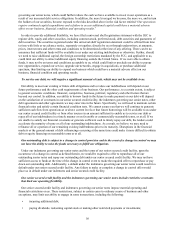Metro PCS 2010 Annual Report Download - page 61
Download and view the complete annual report
Please find page 61 of the 2010 Metro PCS annual report below. You can navigate through the pages in the report by either clicking on the pages listed below, or by using the keyword search tool below to find specific information within the annual report. 51
Act, from which the FCC obtains its authority and state regulatory enabling legislation, may be interpreted in a
manner that imposes additional costs for compliance or be further amended in a manner that could be adverse to us.
Further, with the change in party affiliation of the President of the United States and changes in the composition of
Federal and state legislatures and regulatory commissions, there may be additional legislative or regulatory changes
that affect our business. The FCC also may change its rules, which could result in adverse consequences to our
business, including harmful interference to our existing networks and spectrum. The FCC also is considering
various spectrum allocations in bands adjacent or proximate to those licensed to us that may result in interference to
our systems. If, as a result of interference, our customers experience a significant increase in dropped calls or
significantly degraded service, we could experience higher churn and we may have difficulty adding additional
customers, which could have an adverse effect on our business, our financial condition and operating results. In
addition, the interference may cause our networks to have reduced capacity, which may require us to incur
additional costs of adding cell sites or DAS nodes and to spend additional capital or may limit our ability to serve
our customers, limit our growth, or increase our churn.
We also are subject, or potentially subject, to a number of additional federal, state, and local laws, rules,
ordinances and requirements, including, but not limited to, common carrier obligations; universal service
obligations; number portability requirements; number pooling rules; rules governing billing, subscriber privacy and
customer proprietary network information; tower lighting and painting; access to E911 and location accuracy
requirements; roaming obligations; rules that require wireless service providers to configure their networks to
facilitate electronic surveillance by law enforcement officials; rate averaging and integration requirements;
emergency warning requirements; bill shock; rules governing spam, telemarketing and truth-in-billing; equal
employment opportunity reporting requirements; outage reporting; and rules requiring us to offer equipment and
services that are accessible to and usable by persons with disabilities, among others. There are also pending
proceedings including, but not limited to proceedings exploring the imposition of various types of nondiscrimination
and open access obligations on our handsets and networks; the prohibition of handset exclusivity; the possible re-
imposition of bright-line spectrum aggregation requirements; further regulation of special access used for wireless
backhaul services; requirements relating to information to be provided to customers; allocation of additional
spectrum for wireless services, including modifying rules related to use of existing spectrum for wireless use; and
the effects of the siting of communications towers on migratory birds, among others. Additionally, we may be
subject to claims for violations of environmental law, regardless of fault, as a lessee or owner of any of our tower
sites. Some of these requirements and pending proceedings, including without limitation those described above,
pose technical and operational challenges to which we, and the industry as a whole, have not yet developed clear
solutions and may require us to spend money to become in compliance. Further, these requirements generally are the
subject of pending FCC, federal, state, local or judicial proceedings, and we are unable to predict how they may
affect our business, financial condition or results of operations.
Our business also is subject to various other regulations, including certain regulations promulgated by the Federal
Trade Commission, the Federal Aviation Administration, the Environmental Protection Agency, the Occupational
Safety and Health Administration, the Securities Exchange Commission, the Department of Labor, the FCC, and
other federal, state and local regulatory agencies and legislative bodies. Adverse decisions or regulations of these
regulatory bodies could negatively impact our operations and costs of doing business. Because of our smaller size,
relatively smaller resources, more limited spectrum holdings, concentration of operations in a few states in major
metropolitan areas, and composition of our current and prospective customer base, governmental regulations and
orders can disproportionately increase our costs and affect our competitive position compared to other larger
telecommunications providers. We are unable to predict the scope, pace or financial impact of regulations and other
policy changes that could be adopted by the various governmental entities that oversee portions of our business. As
previously noted herein, a variety of changes in regulatory policies are under consideration and depending upon the
outcomes, the changes could have a material adverse effect on our business, financial condition and operating
results.
Compliance with current or future federal, state, or local laws, regulations, rules, and ordinances could have a
material adverse effect on our business, financial condition and operating results, including but not limited to,
increasing our operating expenses or costs, requiring us to obtain new or additional authorizations or permits,
requiring us to change our business and customer service processes, limiting our ability to attract and retain certain
customer segments, increasing our costs and expenses to offer services, increasing the costs of our services to our
customers, requiring system and network upgrades, increasing cost of insurance coverage, requiring us to hire
additional employees, requiring us to spend significant additional capital, limiting the capacity of our networks,
limiting the services we can offer our customers, requiring us to change our business strategy and service plans. A
failure to meet, or maintain compliance with, federal, state or local regulations, laws, rules or ordinances also could


